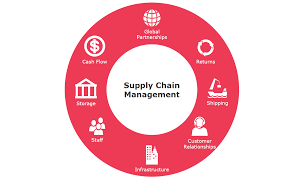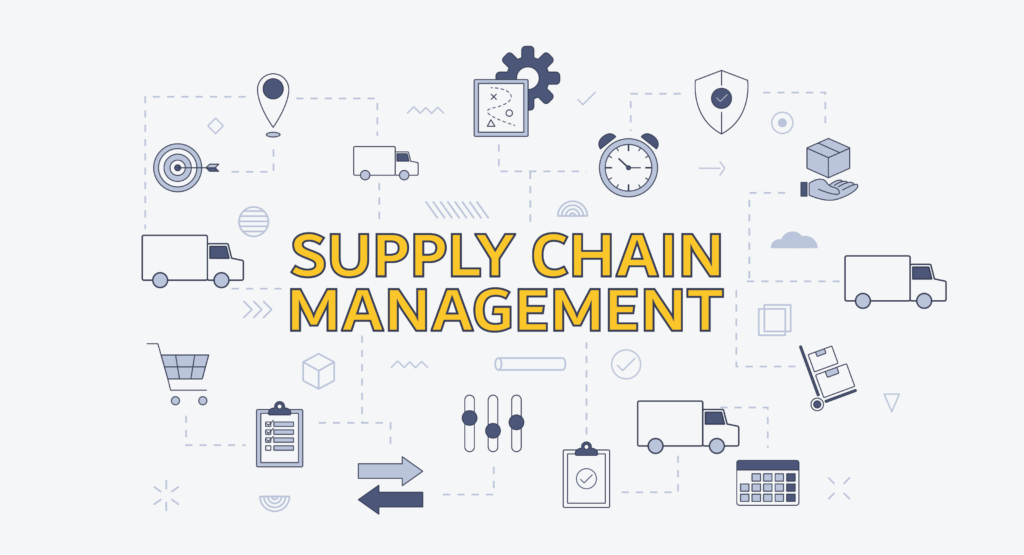The Role of Artificial Intelligence in Supply Chain Management
In today’s rapidly evolving business landscape, supply chain management plays a crucial role in ensuring the seamless flow of goods and services from suppliers to customers. With the advent of technology, artificial intelligence (AI) has emerged as a powerful tool that revolutionises supply chain operations. This blog explores the various ways AI is transforming and enhancing supply chain management.

Supply chain management involves the coordination and integration of various activities, including procurement, production, warehousing, transportation, and distribution. It aims to optimise these processes to deliver products or services efficiently, reduce costs, and meet customer demands. The integration of AI into supply chain management has opened up new possibilities for efficiency, accuracy, and decision-making.
Definition of Supply Chain Management
Supply chain management is the strategic management of the flow of goods, services, information, and finances involved in the production and delivery of products or services from the point of origin to the point of consumption. It encompasses activities such as sourcing, procurement, production, refrigerated logistics, and customer service.
Importance of Supply Chain Management
Efficient supply chain management is vital for businesses to gain a competitive edge. It enables companies to streamline their operations, reduce costs, minimise inventory holding, and deliver products or services to customers promptly. Effective supply chain management also enhances customer satisfaction by ensuring product availability and timely deliveries.
Challenges in Supply Chain Management
Supply chain management faces several challenges that impact operational efficiency and customer satisfaction. These challenges include demand volatility, supply disruptions, complex global networks, lack of visibility, inefficient inventory management, and increasing customer expectations. AI-powered solutions have the potential to address these challenges effectively.
Role of Artificial Intelligence (AI)
Artificial intelligence refers to the simulation of human intelligence in machines that are programmed to think, learn, and make decisions. Technologies empower businesses to process vast amounts of data, analyse complex patterns, and make accurate predictions. ArtyifiI enables real-time visibility, proactive decision-making, and automation of routine tasks.
AI Applications in Supply Chain Management
AI for Demand Forecasting
Accurate demand forecasting is crucial for optimising inventory levels, production planning, and meeting customer demands. AI algorithms can analyse historical data, market trends, external factors, and customer behaviour to generate more accurate demand forecasts. This helps companies avoid stockouts, minimise inventory costs, and optimise their supply chain processes.
AI for Inventory Management
AI-powered inventory management systems enable real-time tracking and optimisation of inventory levels. By analysing demand patterns, lead times, and supplier performance, AI algorithms can recommend optimal inventory levels, reorder points, and safety stocks. This ensures that companies maintain sufficient inventory while minimising holding costs and stockouts.
AI for Supplier Selection and Management
Selecting reliable suppliers and managing supplier relationships are critical aspects. AI can assist in supplier evaluation, risk assessment, and performance monitoring. By analysing supplier data, quality metrics, and market dynamics, AI algorithms can provide insights to optimise supplier selection and negotiate better terms.
AI for refrigerated logistics and Route Optimisation
Efficient refrigerated logistics and route optimisation are essential for timely deliveries and cost reduction. AI algorithms can analyse various parameters such as distance, traffic patterns, weather conditions, and delivery constraints to optimise delivery routes. By considering real-time data and dynamic factors, AI can help companies minimise transportation costs, reduce fuel consumption, and enhance overall refrigerated logistics efficiency.
AI for Risk Management
Supply chain management involves inherent risks such as supply disruptions, natural disasters, and market fluctuations. AI can aid in risk identification, assessment, and mitigation. By analysing data from multiple sources, including historical data, market trends, and external factors, AI algorithms can predict potential risks and provide early warnings. This allows companies to take proactive measures, develop contingency plans, and minimise the impact of disruptions on the supply chain.
AI for Customer Relationship Management
Customer satisfaction is a key driver of business success. AI can assist in enhancing customer relationship management by analysing customer data, preferences, and behaviour patterns. AI-powered chatbots and virtual assistants can provide personalised recommendations, address customer queries, and facilitate seamless interactions. By leveraging AI, companies can improve customer engagement, loyalty, and overall satisfaction.
Benefits of AI in Supply Chain Management
The integration of AI offers numerous benefits. These include:
- Improved Operational Efficiency: AI enables automation of routine tasks, data analysis, and decision-making processes, leading to increased efficiency and productivity.
- Enhanced Accuracy and Predictability: AI algorithms can analyse vast amounts of data, identifying patterns and making accurate predictions, thereby improving forecasting and planning accuracy.
- Real-time Visibility and Transparency: AI provides real-time visibility into supply chain processes, allowing companies to track inventory, monitor shipments, and identify bottlenecks promptly.
- Cost Reduction: AI-powered optimisation algorithms can minimise costs associated with inventory management, transportation, and resource allocation.
- Proactive Decision-making: AI algorithms can identify potential risks and opportunities, enabling companies to make proactive decisions and stay ahead of the competition.
Concerns and Limitations of AI
While AI offers significant advantages, it is essential to address potential concerns and limitations. These include:
- Data Security and Privacy: AI relies on vast amounts of data, raising concerns regarding data security, privacy, and compliance with regulations.
- Dependence on Technology: Overreliance on AI systems may create vulnerabilities and potential disruptions if the technology fails or malfunctions.
- Ethical Considerations: The use of AI in supply chain management raises ethical concerns, such as job displacement, algorithmic bias, and decision accountability.
- Implementation Challenges: Integrating AI into existing supply chain systems and processes may require substantial investments, technical expertise, and change management efforts.
Future Trends in AI and Supply Chain Management
The role of AI is expected to evolve further in the future. Some key trends to watch out for include:
- Advanced Predictive Analytics: AI algorithms will become more sophisticated, leveraging advanced predictive analytics techniques to enhance demand forecasting, risk management, and decision-making.
- Internet of Things (IoT) Integration: The integration of AI with IoT devices will enable real-time data collection, enabling better visibility and control over supply chain processes.
- Blockchain Technology: Blockchain technology can enhance transparency, traceability, and security in supply chain management by providing immutable records and smart contracts.
- Autonomous Vehicles and Drones: AI-powered autonomous vehicles and drones have the potential to revolutionise last-mile delivery, enabling faster and more efficient transportation.
Conclusion
Artificial intelligence is reshaping the field offering unprecedented opportunities for efficiency, accuracy, and innovation. By harnessing the power of AI, companies can streamline their operations, enhance customer satisfaction, and gain a competitive edge in the dynamic business landscape. However, it is crucial to address concerns surrounding the ethical implications, data security, and implementation challenges associated with AI adoption.
In conclusion, the role of artificial intelligence in supply chain management cannot be overstated. AI technologies have the potential to transform the way businesses operate, optimise processes, and deliver value to customers. From demand forecasting and inventory management to refrigerated logistics optimisation and risk mitigation. AI offers a range of applications that enhance efficiency, accuracy, and decision-making.
However, it is essential for businesses to approach AI implementation thoughtfully and address concerns surrounding data security, privacy, and ethical considerations. Collaboration between human expertise and AI capabilities is crucial to leverage the full potential of this technology. By embracing AI in companies can unlock new possibilities and gain a competitive edge. Navigate the complexities of the modern business landscape.
Helpie FAQ
- Simple FAQSimple FAQ Content
- Simple FAQ - 2Simple FAQ Content - 2
- Your First FAQ QuestionYour relevent FAQ answer.
